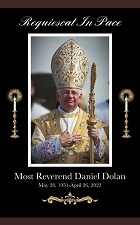Objection: A certain anti-Catholic sect, previously exposed in the articles called "The Papacy and the Papal States", “God is the Father of all Men”, “God is the Father of all Men. Part 2”, and “Who may Preach?”, holds the following false idea about Holy Mass: “Since the death of Pope Pius IX there are no valid bishops or priests who are able to offer the Holy Sacrifice of the Mass. Therefore, laymen are only allowed to read a missal for the laity and to make a Spiritual Communion.”
Response: The members of this sect are using two books to justify their false thesis: “The Raccolta” of 1878 and "THE ROMAN MISSAL FOR THE USE OF THE LAITY” of 1865. They are acknowledging these books as good because they were published during the reign of Pope Pius IX, who, in their opinion, was the last Roman Pontiff.
One can only rejoice that the sectarians refer to the Catholic books. On the other hand, it is seems that they are not familiar with the content of the books used by them as proof. Otherwise they would probably prefer not to refer to them, since these books refute the false thesis proposed by them.
From these books it is unambiguously clear that bishops and priests should celebrate the Holy Mass “to the end of the world” (see prayer in the Raccolta of 1878). Both books encourage the laity to participate in the Holy Mass and to receive Holy Communion during the Mass as well.
THE RACCOLTA of 1878:
PRAYER
TO BE SAID AT THE BEGINNINS OF THE DAY.
Lord, God almighty, behold me prostrate before thee, in order to appease and honor thy divine majesty, in the name of all creatures. But how can I do it, - I a wretched sinner.
Yes, I can, and I will do it; because I know that thou dost glory in being called the Father of mercy, and that, for love of us, thou hast given even thy only-begotten Son, who offered himself for us on the cross, and who continually renews for us the same sacrifice on our altars. And therefore, though a sinner, yet truly penitent, wretched, and yet rich in Jesus Christ, I present myself before thee, and with the fervor of all the saints and angels, and with the ardent love of the Immaculate Heart of Mary, I offer thee, in the name of all creatures, the masses which are now being said, with all those which have been said, and which will be said to the end of the world. I also desire to renew this offering, at every instant of this day, and of my whole life, in order to give thy infinite majesty honor and glory worthy of thee; to appease thy wrath, and to satisfy thy justice for our many sins; to render thee thanks in keeping with thy benefits, and to implore thy mercy for myself and for all sinners, for all the faithful, living and dead, for the whole Church, and chiefly for its visible head, the Roman Pontiff; and lastly, for all poor schismatics, heretics, and infidels, that they also may be converted and saved.
AN OFFERING
TO BE MADE DURING THE TIME OF MASS.
Eternal Father, I offer thee the sacrifice which thy beloved Son, Jesus, made of himself on the cross, and now renews on this altar. I offer it in the name of all creatures, together with the masses which have been said and which will be said throughout the whole world, to adore thee and to give thee the honor which thou deservest; to render to thee the thanks which are due thee for thy numberless benefits, to appease thy anger, and to satisfy for our many sins; to supplicate thee for myself, for the Church, for the whole world, and for the blessed souls in purgatory.
His Holiness, Pope Pius IX., by a rescript from the Office of the Secretary of Briefs, April 11, 1860, granted to all the faithful who, with at least contrite heart and devotion, shall say this prayer at the beginning of the day:
AN INDULGENCE OF THREE YEARS, once a day.
AN INDULGENCE OF THREE YEARS, once a day, to all those who, with at least contrite heart and devotion, shall say, during the mass, the offering, Eternal Father.
A PLENARY INDULGENCE, once a month, to all who, after saying every day, for a month, the two prayers given above, shall, on any day, being truly penitent, after confession and communion, visit their parish church, or some other public church, and pray there for peace and union among Christian princes, for the extirpation of heresy, and for the triumph of holy Mother Church. (1)
The main purpose of "THE ROMAN MISSAL FOR THE USE OF THE LAITY" is the careful study of the Roman Missal in order to understand the end and beauty of the Catholic Liturgy, not to ‘celebrate a mass’ without a priest, as the sectarians say.
One can see in the Rubrics that only a priest is the minister of the Holy Sacrifice of the Mass:
THE ROMAN MISSAL FOR THE USE OF THE LAITY of 1865:
"The priest at the Foot of the Altar, beginning, saith …", "The Priest going up to the Altar, says …", "Turning towards the people, the Priest salutes them, saying …", "When the Priest puts the Wine and Water into the Chalice, he says …", "After pronouncing the Words of Consecration, the Priest kneeling, adores and elevates the sacred Host”, "Here also kneeling, he adores and elevates the Chalice …", etc.
PREFACE TO THE PRESENT EDITION.
The use of the Roman Missal in their vernacular language seems scarcely to be appreciated by the laity. The Catholic mind, so habituated to the Great Sacrifice of the New Law, feels, in the presence of the Atoning Victim, as if words or vocal prayers were needless, and union of mind and heart sufficient. There is much of truth and solid piety in this thought: and yet it will be found, that the approved language of the Church will not unfrequently excite and sustain that piety.
The great benefit, if not the principal end of the Liturgy, appears to be the daily application of the Great Sacrifice, in thanksgiving to God for his varied blessings, and in seeking his protection in the many difficulties to which we are so frequently exposed.
The beautiful selection from the Sacred Scripture with which the Missal is so filled, cannot fail to enlighten the attentive mind; whilst the appropriate Collects and other prayers which the Church has added, must console and strengthen the piety of her children. Indeed, the careful study of the Roman Missal will afford the sweetest and most convincing testimony of the Divine economy in the establishment and protection of the Church. The Masses and ceremonies of Lent, Holy Week, Advent, and Quatuortence, furnish not only food for piety, hut for deep religious instruction; whilst the Sundays and Movable Festivals afford matter for the history of our Lord's life, and of the formation and direction of the Church which is his Kingdom upon the Earth.
In the edition now puhlished, many Masses appear for the first time in the American reprint. The Masses devoted to the Fridays of Lent, to the Sacred Heart of Jesus, and the various Festivals of the Blessed Virgin, as also of St. Alphonsus Liguori, will be found in the Appendix. The Calendar for each month is re-arranged, and a table of General Contents has been added.
To understand the end and beauty of the Catholic Liturgy, there can he no more appropriate or practical book than the Roman Missal in the English language; and it is hoped that the present volume will fully satisfy the pious and inquiring mind.
FEAST OP THE IMMACULATE CONCEPTION, 1860. (2)
Conclusions:
- There is not a single word in either “THE RACCOLTA” of 1878 or “THE ROMAN MISSAL TRANSLATED INTO THE ENGLISH LANGUAGE FOR THE USE OF THE LAITY” of 1865 indicating that priests and bishops are forbidden to celebrate the Holy Mass after the death of Pope Pius IX. There is also no prohibition for laymen to receive Holy Communion during the Mass to be found.
- From aforementioned books one can conclude that laymen are obliged to participate at Holy Mass when a priest celebrates the Mass.
- The Church in unity with Pope Pius IX encourages both priests and laity to be faithful to the Holy Mass “to the end of the world”.
Fr. Valerii
References:
(1) THE RACCOLTA;
OR Collection of Prayers and Good Works,
TO WHICH THE SOVEREIGN PONTIFFS HAVE
ATTACHED HOLY INDULGENCES.
PUBLISHED BY ORDER OF HIS HOLINESS, POPE PIUS IX.
TRANSLATION AUTHORIZED AND APPROVED
BY THE SACRED CONGREGATION OF HOLY INDULGENCES.
WOODSTOCK COLLEGE, MARYLAND.
1878.
APPROVED AND COMMENDED.
+JOHN CARD. McCLOSKEY,
Archbishop of New York. New York, Sept. 5th, 1878.
Imprimatur: +JACOBUS, ARCHIEP. BALTIMORENSIS. Die xxii Sept., 1878.
pp. 21-23.
(2) THE ROMAN MISSAL
TRANSLATED INTO THE ENGLISH LANGUAGE
FOR THE USE OF THE LAITY
PUBLISHED WITH THE APPBOBATION OF
THE RIGHT REV. THE BISHOP OF PHILADELPHIA
FIRST REVISED EDITION
PHILADELPHIA.
PUBLISHED BY EUGENE CUMMISKEY
1037 CHESTNUT STREET.
1865.
The Roman Missal translated into English for the use of the Laity, and now revised, and arranged by a Clergyman of the Diocese, is hereby duly approved of, and recommended by me to the faithful.
FREDERICK JAMES,
Bishop of Philadelphia.
pp. iii-iv
|

